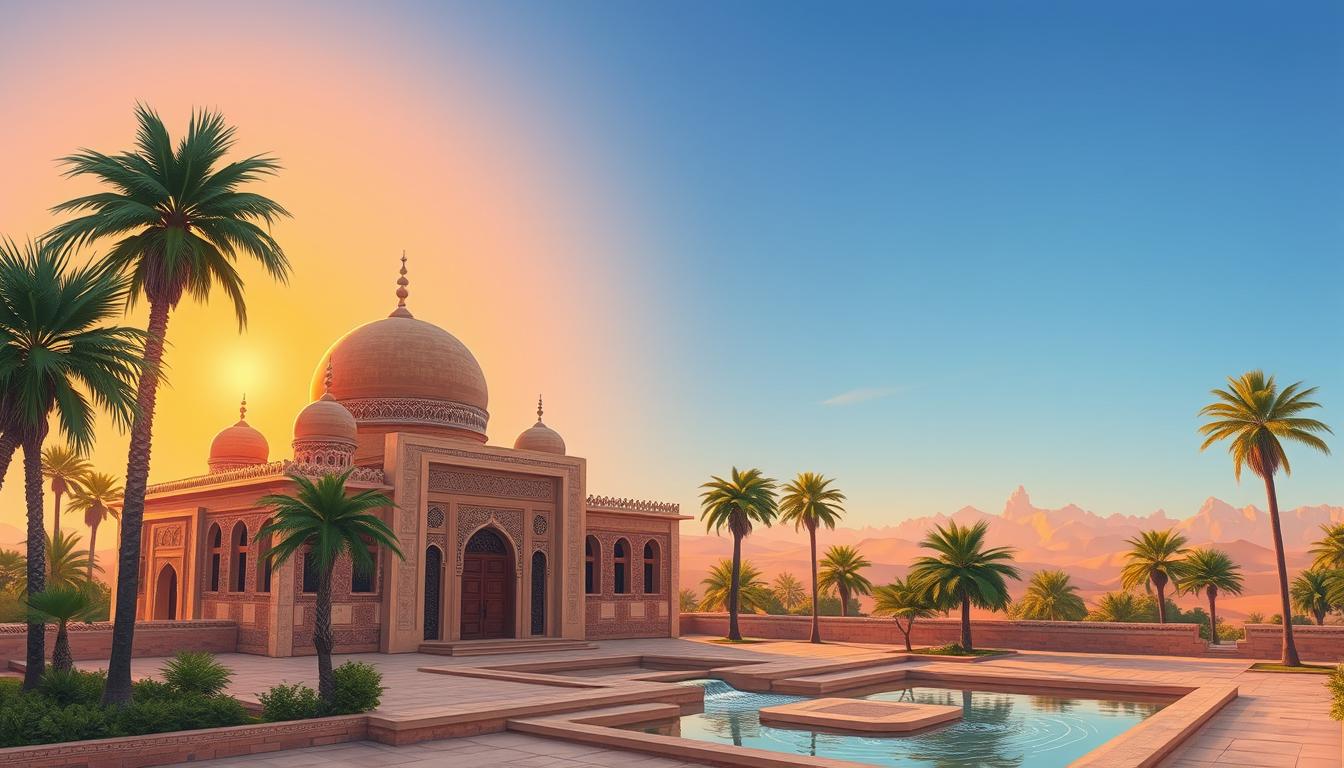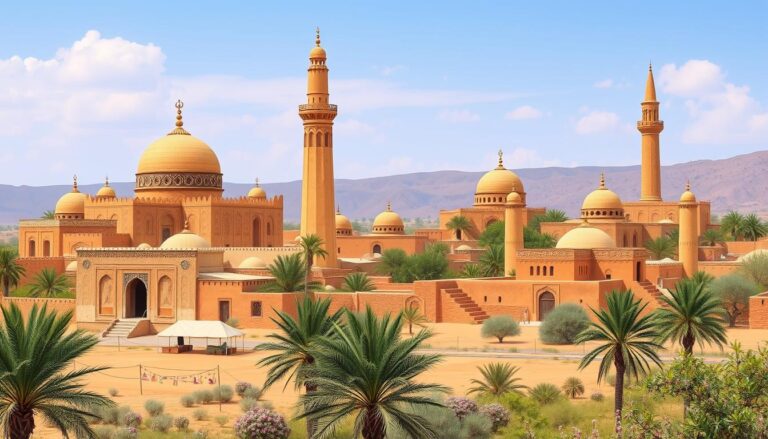Islam in Iraq
Iraq’s history with Islam goes back to the 7th century CE, when Prophet Muhammad lived. Today, more than 95% of Iraqis follow Islam. They are mostly Sunni and Shia Muslims.
Islam has deeply influenced Iraqi society, culture, and politics for centuries. The country is home to many important religious sites and cities. This article will delve into Islam’s origins, history, traditions, challenges, and future in Iraq.
Origins and History of Islam in Iraq
The story of Islam in Iraq began in the 7th century CE. It started when Prophet Muhammad introduced the faith to Mesopotamia. Over time, Islamic History in Iraq grew, especially under the Abbasid Caliphate. They ruled from Baghdad, the heart of the Islamic empire, from 750 to 1258 CE.
Arrival of Islam in Mesopotamia
The Arrival of Islam in Iraq began with Arab armies conquering the area. They brought Islam with them. Slowly, the local people started to adopt the faith, making it a big part of Mesopotamia’s culture and society.
Spread of Islam during the Abbasid Caliphate
Under the Abbasid Caliphate, Baghdad became a center of Islamic learning and scholarship. It played a key role in spreading Islamic thought and practices. This era saw a rise in Islamic art, architecture, and science, making Islam a cornerstone of Iraqi society.
“The Abbasid Caliphate played a pivotal role in the expansion and consolidation of Islamic influence in Iraq, transforming the region into a center of religious, cultural, and intellectual excellence.”
Sunni and Shia Divide in Iraq
In Iraq, most Muslims are either Sunni or Shia. About 55-60% are Shia, and 35-40% are Sunni. This division has shaped Iraq’s history, politics, and society. Sunni Muslims live mainly in the center and west. Shia Muslims are mostly in the south and east.
Demographics and Distribution
Worldwide, Sunni Islam is the biggest tradition, with 85% of Muslims. Shia Islam makes up about 15%. But in Iraq, Shia Muslims have a slight edge over Sunnis.
In the region, countries have different religious mixes. Iran is mostly Shia, with 90-95% of the population. Saudi Arabia, on the other hand, is mostly Sunni, with about 10% Shia. The Shia-Sunni divide has led to tensions in the Middle East since the Iranian Revolution in 1979.
“The sectarian divide between Sunnis and Shias in Iraq has been a source of conflict and instability for decades, with both groups vying for political and social dominance.”
Knowing about Sunni and Shia Muslims in Iraq helps us understand the region’s complex religious scene.
Prominent Religious Cities and Sites
Iraq is filled with important religious cities and sites for Sunni and Shia Muslims. Baghdad, Karbala, and Najaf are key places. They have greatly shaped Islam in Iraq.
Baghdad: A Hub of Islamic Learning
Baghdad was once the heart of the Abbasid Caliphate, a time of great Islamic achievement. It was a place where scholars, poets, and thinkers gathered. The Bayt al-Hikma, or House of Wisdom, was famous for its library and research in astronomy, mathematics, and philosophy.
Karbala and the Battle of Karbala
Karbala is sacred for Shia Muslims because of the Battle of Karbala. In 680 CE, Imam Husayn, Prophet Muhammad’s grandson, was killed there. Shia Muslims remember this event every year with Ashura, a time of mourning and reflection.
Najaf and the Tomb of Imam Ali
Najaf is famous for the tomb of Imam Ali, seen as Prophet Muhammad’s rightful successor by Shia. The Shrine of Imam Ali is a major pilgrimage site for Shia Muslims. It attracts millions each year. Najaf is considered the fourth holiest site in Islam, after Mecca, Medina, and Jerusalem.
These sites in Iraq are vital to the country’s Islamic identity and culture. They have been centers of spirituality, learning, and culture for centuries.
Islam in Iraq
Islam is the main religion in Iraq, with over 95% of people calling themselves Muslim. Most Iraqi Muslims are either Sunni or Shia. Each group has its own beliefs and history. Islam is a big part of Iraqi life, affecting culture, government, and laws.
The Shia branch of Islam is the biggest in Iraq, making up 55-60% of Muslims. Sunnis make up about 35-40% of Muslims. Other religious groups, like Christians, make up about 3% of the population.
Iraqi society is deeply influenced by Islamic traditions. Islam plays a big role in daily life and important events. Knowing about Islam in Iraq helps us understand the country’s history, current situation, and future.
“Islam is not just a religion, but a way of life in Iraq. It shapes our identity, our values, and our entire social structure.”
The religious landscape in Iraq has been shaped by history and politics. The Sunni-Shia divide has led to ongoing tensions and conflicts. External actors, like Iran, have also influenced Iraq’s religious and political scene.
Despite challenges, there are efforts to bring different religious groups together in Iraq. The future of Islam in Iraq will keep changing, influenced by internal and global factors.
Role of Islam in Iraqi Society and Culture
Islam has been a key part of Iraqi society and culture for a long time. It shapes the daily lives, traditions, and art of the Iraqi people. The iconic spiral minaret of the Great Mosque of Samarra and the intricate designs on mosques show Islam’s impact.
Islamic Practices and Traditions
Iraqi Muslims follow the five pillars of Islam. These include declaring faith, praying daily, fasting in Ramadan, giving to charity, and making the Hajj to Mecca. These practices are a big part of Iraqi life, with the adhan (call to prayer) heard everywhere. Important Islamic holidays like Eid al-Fitr and Eid al-Adha are celebrated with joy and community.
Islamic Architecture and Art
Iraq’s buildings show the beauty of Islamic architecture and art. The Imam Ali Shrine in Najaf has stunning blue-tiled domes. The Umayyad Mosque in Mosul has beautiful calligraphic patterns. These buildings and many mosques and shrines show the strong Islamic Influence in Iraqi Culture.
The Islamic Practices in Iraq and the Islamic Architecture and Art show Islam’s deep impact. This mix of faith and daily life shows how important Islam is to the Iraqi people.
Religious Minorities in Iraq
Islam is the main religion in Iraq, but other faiths like Christianity, Yazidism, Mandaeism, and Zoroastrianism also exist. This mix of religions has shaped Iraq’s culture for centuries.
Christianity in Iraq
Christianity has been in Iraq since the 1st century CE. Most Christians live in the north. They have faced persecution and had to leave their homes. Yet, Christianity remains strong in Iraq, adding to the country’s culture and society.
Yazidism and Other Faiths
Yazidism is found mainly in the Nineveh region of Iraq. It’s a unique faith with its own customs and traditions. Other groups like Mandaeans and Zoroastrians also live in Iraq, adding to the country’s religious diversity.
“The diversity of Iraq’s religious minorities is a testament to the country’s rich cultural heritage and the resilience of its people.”
Despite the challenges, efforts are being made to promote understanding and tolerance among all faiths. The Kurdistan Region of Iraq is working to protect the rights of all groups. This gives hope for a future where all religions can coexist peacefully.
Challenges and Conflicts Surrounding Islam in Iraq
Islam plays a big role in Iraqi society, but the country faces big Challenges Facing Islam in Iraq. For years, Sunni and Shia sects have been at odds, causing Sectarian Conflicts in Iraq. Groups like ISIL have made things worse, attacking religious minorities and adding to the Religious Tensions in Iraq.
Violence and attacks have hurt Iraq for years. Over one million people are displaced, and three million need help to rebuild. The world has come together, with nearly eighty countries fighting against ISIL.
It’s key to work on peace and unity among Iraq’s different religious groups. Former President Barack Obama started air strikes against ISIL. Now, about 2,500 U.S. troops help the Iraqi military fight terrorism.
But, the journey to peace is hard. In 2021, there was an attempt to kill the Prime Minister. In 2022, a key cleric stepped down, making things even harder for Iraq’s politics.
As Iraq deals with Challenges Facing Islam in Iraq, Sectarian Conflicts in Iraq, and Religious Tensions in Iraq, unity is crucial. Working together is the only way Iraq can find stability and success.
“The path to peace in Iraq is not an easy one, but it is a necessary one. Only through understanding, dialogue, and a commitment to coexistence can we overcome the divisions that have torn this country apart.”
– Abdul Latif Rashid, President of Iraq
Islamic Law and Governance in Iraq
Islamic law and governance have shaped Iraq’s politics and laws. The country’s constitution makes Islam the official religion. Sharia law is part of the legal system. The relationship between Islam and the state is complex and changing.
Iraq has a population of 28.9 million, with 97% being Muslim. Shia Muslims are the majority, between 60 to 65%. Arab and Kurdish Sunni Muslims make up 32 to 37%. The rest are religious minorities like Christians and Yazidis.
The Iraqi government tries to balance Islamic law with the needs of its diverse people. Debates and conflicts surround the role of religion in laws and politics. These issues are made worse by sectarian tensions and extremist groups like the Islamic State (IS).
“Islamic law does not recognize concepts such as ‘war crimes,’ ‘crimes against humanity,’ ‘genocide,’ or the ‘crime of aggression,’ instead differentiating between crimes against individuals and crimes against the state (or ‘crimes against security’).”
Applying Sharia law in Iraq has faced criticism. There are concerns about its alignment with human rights and minority rights. Efforts to merge Islamic law with modern governance are ongoing but complex.
As Iraq navigates the role of Islam in governance, the future is uncertain. The balance between Islamic and secular principles is crucial to address.
Future of Islam in Iraq
Iraq faces many challenges and conflicts related to Islam. The future of Islam in Iraq is uncertain. To shape the country’s religious future, reconciliation and religious coexistence among different groups are key.
Reconciliation and Coexistence
Addressing sectarian tensions and extremism is crucial. Iraq needs a society that values its diverse religious heritage. After the 2003 regime collapse, Iraq adopted a system where Kurds, Sunni, and Shia share power.
The post-Saddam era saw Shia gain more influence. Shia leader Said Ali Al-Sistani encouraged Shia to vote in the 2005 election. The Shia revival gained momentum when ISIS took Mosul on June 10, 2014. This led to Shia forming the People’s Mobilization Forces (PMF) against ISIS.
“The existence of Shia militias like Hashed Shabi in Iraq has influenced the political situation, creating complexity and unpredictability in Iraq and the Middle East.”
The future of Islam in Iraq depends on the government and religious leaders. They must foster dialogue and promote a tolerant society. This way, all religious communities can live together in peace.
Conclusion
Islam has been a key part of Iraqi society for centuries. It has shaped the country’s history, culture, and politics. From the 7th century to today, Islam’s story in Iraq is filled with diversity, conflict, and resilience.
After the defeat of ISIS in 2017, Iraq is now facing a big challenge. The country needs to find a way to balance the complex role of Islam in its identity. This is crucial for national unity.
The tensions between Sunni and Shia Muslims are still a big issue. Minorities like the Yazidis are also facing a lot of hardship. These problems show the need for a broad, inclusive approach to Islam’s role in Iraq.
Prime Minister Mohammed Shia al-Sudani’s visit to the White House is a positive sign. It shows Iraq’s commitment to strengthening ties with the U.S. and navigating the Middle East’s changing landscape.
Looking ahead, Iraq must focus on reconciliation and understanding. It’s important to recognize Islam’s influence on the Iraqi people and their culture. By addressing historical, political, and social factors, Iraq can build a stable and inclusive future. This future will honor the rich religious and cultural heritage of the Iraqi people.
Source Links
- Islam in Iraq
- Religion in Iraq
- Iraq – Arabs, Mesopotamia, Tigris-Euphrates
- Shia Islam in Iraq
- Iraq – United States Department of State
- The Sunni-Shia Divide
- The Sunni-Shia divide: Where they live, what they believe and how they view each other
- Shia–Sunni relations
- Holy Islamic Sites in Iraq — Young Pioneer Tours
- The pilgrimage sites of Iraq’s timeless and holy cities
- Iraq
- Religious Politics in Iraq
- Iraq – Shiah, Sectarianism, Middle East
- Islamist Politics in Iraq after Saddam Hussein
- Five Facts You Need To Know about Iraq, its Religious Minorities, & ISIS — KEN CHITWOOD
- 2.15. Religious and ethnic minorities, and stateless persons
- Minorities in Iraq
- Instability in Iraq | Global Conflict Tracker
- Iraq – United States Department of State
- Islamic Law and the Balancing of Justice and Peace in Iraq’s Post-IS Landscape
- Iraq – United States Department of State
- The Shia armed groups and the future of Iraq
- The Future of the Islamic State in Iraq and Syria after the Killing of its Latest Caliph
- Islamist Politics in Iraq after Saddam Hussein
- Microsoft Word – Capstone Paper 5-3 6pm.doc
- An Unhappy Return: What the Iraqi Islamic Party Gave Up to Gain Power







